I had the great privilege of interviewing Paraclete Associate and author Jenny Smith. Her unusual and difficult path to ministry inspires me, as I’m sure it will you too. The following has been edited for clarity and length:
How did you meet Jesus?
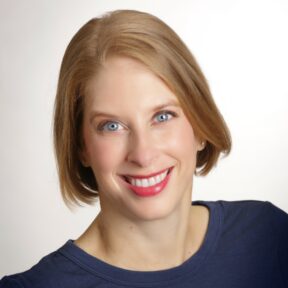 I grew up in church, so there was never a time when I didn’t know about Jesus. So, I don’t have some flashy story, I’m really fortunate to have grown up in church. I grew up in the northwest suburbs of Chicago until I was 11. Then we moved to Louisville. Someone invited us to a non-denominational Christian Church, and in 7th grade, I decided to get baptized. It was more of a confirmation than that this is what I believe. I had some great youth ministers who really poured into me, deepened my knowledge, understanding, faith, and ability to study. I was very, very fortunate.
I grew up in church, so there was never a time when I didn’t know about Jesus. So, I don’t have some flashy story, I’m really fortunate to have grown up in church. I grew up in the northwest suburbs of Chicago until I was 11. Then we moved to Louisville. Someone invited us to a non-denominational Christian Church, and in 7th grade, I decided to get baptized. It was more of a confirmation than that this is what I believe. I had some great youth ministers who really poured into me, deepened my knowledge, understanding, faith, and ability to study. I was very, very fortunate.
You experienced a spinal cord injury when you were 16. What happened?
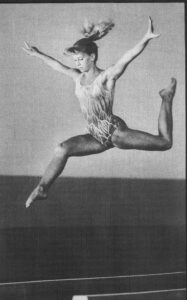 When I was 16, I was outside tumbling. I had been a competitive gymnast growing up. I was tumbling outside doing something that was very easy for me. It wasn’t anything complicated. But the grass was wet that morning. It was July and the dew was still on the grass. I had already done a couple tumbling runs, but this time my feet slipped out from underneath me. I didn’t have enough height or rotation to make it all the way around, so I landed face-first in the grass, and I heard a pop. I didn’t have any feeling or movement from my neck down. My friends ran over and asked me if I was OK. I told them, “Don’t move me; I’ve broken my neck.” I immediately knew what was wrong. I don’t remember ever learning that, but they didn’t move me, which was a good thing. I sustained a C6-7 spinal cord injury. So, I’m a quadriplegic. I can use my arms, but I don’t have use of my hands. Some people think of a quadriplegic as not being able to move your arms at all, but that’s not correct.
When I was 16, I was outside tumbling. I had been a competitive gymnast growing up. I was tumbling outside doing something that was very easy for me. It wasn’t anything complicated. But the grass was wet that morning. It was July and the dew was still on the grass. I had already done a couple tumbling runs, but this time my feet slipped out from underneath me. I didn’t have enough height or rotation to make it all the way around, so I landed face-first in the grass, and I heard a pop. I didn’t have any feeling or movement from my neck down. My friends ran over and asked me if I was OK. I told them, “Don’t move me; I’ve broken my neck.” I immediately knew what was wrong. I don’t remember ever learning that, but they didn’t move me, which was a good thing. I sustained a C6-7 spinal cord injury. So, I’m a quadriplegic. I can use my arms, but I don’t have use of my hands. Some people think of a quadriplegic as not being able to move your arms at all, but that’s not correct.
How did that affect your relationship with God?
Immediately after my friends came up to me, my best friend’s mom came over and kneeled, and she asked me, “Can you feel this?” I said no. I said, “Mary Ann, I think we need to pray.” I knew it was serious. My first reaction, thankfully, was turning to God. It made me kind of cling to Him all the more.
Can you amplify that a little bit?
It’s a difficult thing being in church. I remember the neurosurgeon coming in and saying, “You have this spinal cord injury; you’ll never walk again.” But I also knew what the Bible says about Jesus being able to heal. I’m more analytical. So, the doctor is saying there’s a 99% chance that I would never walk again. Yet the Bible says Jesus heals. It’s difficult to balance. It’s one of those things that I’ve had to let go and say, God’s got this.
What kept you from succumbing to despair but instead propelled you to excel?
There are two different layers of this. The first one is hope, you know, hope with a capital ‘H’. I think that’s what prevented me from going into despair. But what kept me moving forward? It was somewhat unhealthy, in some ways, of needing to prove my worth. So, I’m no longer a gymnast, but I’m a good student. I can get straight “A”s. I can go to college. I can do well. It was positive that I was moving forward. But. I experienced a huge emptiness of losing my identity, not knowing who I was after my injury, and trying to fill that with other identities—being a good student or whatever that might be. Does that make sense? I think anyone who’s experienced a transition, probably coming off the field, can understand. Who am I? What do I do?
Can you talk a little bit more about transitioning your identity?
The biggest point came when I realized that I was no longer a gymnast. I was down at a cheerleading competition with my team. It was about six months after my injury. The year prior, I had been there [as a competitor]. Everyone was watching me because I was one of the best. We had won a big competition. But six months after my injury, everyone was staring at me. I was struggling just to push [my wheelchair] through the thick carpet. I couldn’t get the door open to the hotel or the bedroom. That’s when I realized I was no longer a gymnast. It was just like a dam broke. I wanted to scream to people, “You don’t know who I am!” And it’s probably the first time I really started crying. My friends did not know what to do because they had always seen the “positive Jenny,” you know, everything’s good. It’s easy to see some of that, looking back, but I would say that was the first transition. Starting to drive and getting back some independence was a big transition. Getting some spasticity (muscle spasms) taken care of was a huge transition. Each one of those gave me a little bit more independence.
It was just a slow process [but that’s when] I think the biggest change started to happen. [I started] becoming comfortable with who I was as a person with a disability at the Ms. Wheelchair America pageant. I represented Kentucky. It was really the first time I got to spend a significant period of time with people with similar injuries as myself. [I got] to talk about bladder care and bowel programs and personal care, stuff that I was ashamed of—not just embarrassed of but ashamed of. [I got] to be open and honest with other people and hear them be open and honest and learn from them, see what they were capable of doing. And that was a big, big step for me as well. From that point on, God kept opening up doors. One thing led to another. [But it] always requires a leap to faith, though.
So, tell me about your call to Ministry.
Once again, one thing led to another, to another. I got my master’s degree in counseling psychology. I did not want to do it but knew I was supposed to. When people ask why counseling psychology, all I can say is, “God made me.” But I grew so much through going through that program. I figured that there was a reason then, but at the time, I didn’t understand it. I never wanted to practice counseling or be a therapist. So, when I graduated, I ended up teaching English as a second language for a year for grades K through 5.
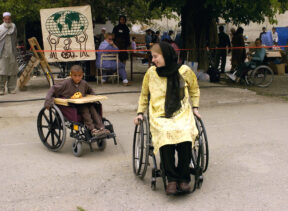 Then I met someone at my church who was going to Afghanistan to distribute wheelchairs. I had spoken with some people a year prior who were from Poland, asking them about accessibility. [I learned] people didn’t even have wheelchairs. That planted a seed. A year later, when I found out someone at my church was doing that, I got in contact with him. He told me about the organization he was going with. And they reached out to me and asked, “Why don’t you come on a trip?” My immediate response was, “That’s impossible! I can’t go overseas!” But six months later, I was in the mountains of Mexico and helping with the wheelchair distribution. It rocked my world—seeing people not even having a wheelchair or any mobility aid, something I took for granted. I went back to teaching but about six months later, they asked if I would be interested in becoming staff. [At that point, my choices were] either getting another master’s degree to continue teaching or [raising] support. [I thought] that was not a very fair choice. What’s the lesser of two evils here? I chose to be in support-based ministry. It just seemed like a perfect fit. I did that for eight years. I worked a lot in Mexico, Costa Rica, El Salvador, and Afghanistan, but primarily Mexico and Afghanistan. [I finished that ministry] without knowing what was next—which I don’t recommend—but it was the way that it needed to be.
Then I met someone at my church who was going to Afghanistan to distribute wheelchairs. I had spoken with some people a year prior who were from Poland, asking them about accessibility. [I learned] people didn’t even have wheelchairs. That planted a seed. A year later, when I found out someone at my church was doing that, I got in contact with him. He told me about the organization he was going with. And they reached out to me and asked, “Why don’t you come on a trip?” My immediate response was, “That’s impossible! I can’t go overseas!” But six months later, I was in the mountains of Mexico and helping with the wheelchair distribution. It rocked my world—seeing people not even having a wheelchair or any mobility aid, something I took for granted. I went back to teaching but about six months later, they asked if I would be interested in becoming staff. [At that point, my choices were] either getting another master’s degree to continue teaching or [raising] support. [I thought] that was not a very fair choice. What’s the lesser of two evils here? I chose to be in support-based ministry. It just seemed like a perfect fit. I did that for eight years. I worked a lot in Mexico, Costa Rica, El Salvador, and Afghanistan, but primarily Mexico and Afghanistan. [I finished that ministry] without knowing what was next—which I don’t recommend—but it was the way that it needed to be.
I had a roommate at the time who worked with a sending organization for missionaries called Team Expansion. She said, “We need a member care person. With your master’s in counseling, you’d be perfect.”
[I replied], “I don’t want to do counseling.”
She was moving away, and at her going away party, one of her coworkers asked, “If you don’t want to do member care, what do you want to do?”
I answered, “I just want to support people who are working overseas.”
Thankfully, she didn’t say anything. She allowed God to hit me over the head with a 2 by 4. That evening as I filled out more applications for jobs that I didn’t want, I kind of heard, “That’s exactly what member care is.” And all I could say was, dang, I’m going to have to eat my words. That was a Friday night. Monday morning, I called the president of the organization and said, “I’m ready to listen.”
I was there for over 13 years. I learned a lot about member care and really enjoyed it. I love working with the people on the field. I really enjoy helping with the pre-field training, getting people ready to go, and then sending them off, and supporting them through the process of transitioning to overseas life and all the heavy stuff that happens when you’re in cross-cultural ministry. And it doesn’t end when you come back from the field, either.
Please describe your work.
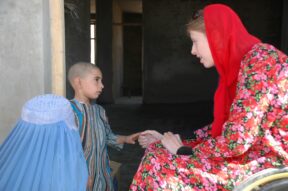 During COVID, everything was online. So, I was attending an online conference about transitions for TCKs (Third Culture Kids). I immediately realized that those models of transitioning and debriefing so beautifully—incredibly and awfully—paralleled those of transitioning to life with a disability. Transitioning to life overseas and transitioning to life with a disability are so similar. Both groups have to learn a new language. One is medical terminology, the other a foreign language. How does transportation work? Relationships are changed. There are so many losses. How do you grieve those losses? And it was just like the light bulb came on.
During COVID, everything was online. So, I was attending an online conference about transitions for TCKs (Third Culture Kids). I immediately realized that those models of transitioning and debriefing so beautifully—incredibly and awfully—paralleled those of transitioning to life with a disability. Transitioning to life overseas and transitioning to life with a disability are so similar. Both groups have to learn a new language. One is medical terminology, the other a foreign language. How does transportation work? Relationships are changed. There are so many losses. How do you grieve those losses? And it was just like the light bulb came on.
For the next year and a half or two years, I worked on adapting that material to disabilities. I’m now using some of that material and facilitating a group. I’m just now finishing my first online group. I decided to do it online because many people don’t have access to transportation. I wanted to keep it small and local for the first group. But we ended up with a couple of local people, a couple from different states, and one international. So, I’ve just seen what a huge need there is for this. It’s been good to see and yet it just hurts my heart to see people in such pain, even years and decades after their injury. I’ve experienced it so I am able to walk alongside them through that process, to give them material, to discuss it, [and help them] know that they’re not alone. [It] normalizes a lot of experiences and gives people a group to talk with.
How did you come to Paraclete, and what does your ministry look like now?
I was wondering, “How can I do this?” The organization I was with focused solely on disciple-making and that was not going to fit [my] model. So, I [started] looking for organizations where I might fit better. And Paraclete seemed like a good fit. And it has been excellent. I’ve been with Paraclete since the beginning of February 2023 and am still trying to figure out what this looks like. But understanding cross-cultural life a little bit better helps. [For example, in some cultures, people] would go to the gym to be able to have conversations. So, I [started] going down to the Community Fitness and Wellness Center, which is wheelchair accessible. It’s primarily for people with disabilities, primarily spinal cord injuries. It’s been a great way to have those conversations without saying, “Hey, you need help.” The [online] group is what I’ve focused on the most so far, just building those relationships. While they’re still in inpatient rehab, I introduce myself, give them my contact information, and let them know I’m available when they have questions. Once people get discharged, I check in on them to how they’re doing. It’s still a work in progress.
Tell me about your book.
People have always said I needed to write a book. I said, “I will never write a book.” I was writing for a urological supply company on the side for some extra income, and I decided to take a class about making money with writing. The next class the teacher was offering was about how to write a memoir. And knew… it’s time. I started writing but didn’t tell anyone. It felt icky, self-centered somehow, and yet it’s really God’s story, not mine because none of this is possible without him. The book is titled Live the Impossible. The subtitle is How a Wheelchair Has taken me Places I Never Dared to Imagine. And it’s true. I would never have set foot—or rolled in—Afghanistan had my injury not happened. I would never have been to Mexico. I wouldn’t have been to all these places. I wouldn’t have been working with people all over the world and able to travel like that for work. Even being involved in the sports that I’m involved in—rowing is my first love—but also tennis and rugby. Telling those stories, giving credit where credit is due. It’s not because of me. Great family and friends have gotten me to where I am with God’s support.
What do you like to do for fun/hobbies?
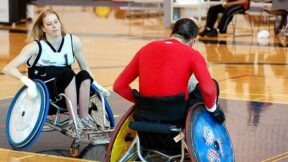 Rugby and especially rowing. Every Saturday, you’ll find me on the river rowing a single or a double. This Fall, we hope to go to a big race in Boston, The Head of the Charles. That’s the goal this year, to race out there. Hopefully, that will happen. I love reading historical novels, reading anything. I do enjoy writing, so I’ll still do some outside work, writing for magazines.
Rugby and especially rowing. Every Saturday, you’ll find me on the river rowing a single or a double. This Fall, we hope to go to a big race in Boston, The Head of the Charles. That’s the goal this year, to race out there. Hopefully, that will happen. I love reading historical novels, reading anything. I do enjoy writing, so I’ll still do some outside work, writing for magazines.
Is there anything else you’d like to share?
I’m grateful for Paraclete’s model of ministry. My current ministry doesn’t fit nicely in a box. With Paraclete, I have the freedom to take the gifts I have and use them in a very unique way.
You can learn more about Jenny’s work by visiting her website: JennySmithRollsOn.com

